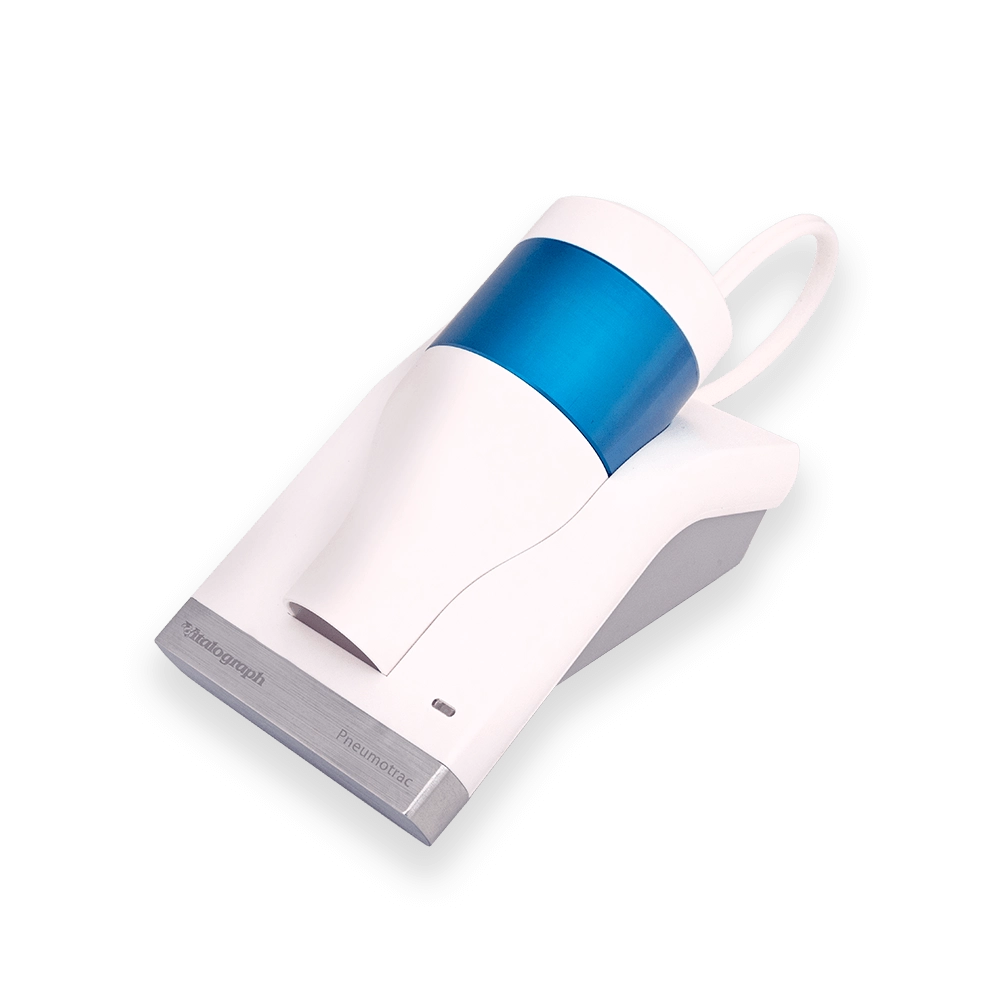Spirometry
If your GP or nurse has asked you to book an appointment for a spirometry, there is a guide here for what a spirometry is and how to prepare for the test.
You can download this as a leaflet if you would prefer - click this link to download it.
Spirometry Preparation
Spirometry is used to help make a diagnosis.
A Spirometer is a machine that measures the speed you breath out and the amount you can breathe out.

What to expect
You will be asked to blow at least 6 times through a mouthpiece that is connected to the spirometer, this will record your lung function. For each blow you will be asked to breath in as much as you can to fill up your lungs before blowing into the mouthpiece either steadily or forcefully.
Because this test requires maximum effort, it is important to make sure that it is suitable for you.
Pre-test instructions
- Avoid taking the following medication for the times given -
| Medication | Withholding time prior to the test |
|---|---|
| Short-acting Reliever e.g. Salbutamol (Ventolin/Easyhaler) / Terbutaline (Bricanyl) | 4-6 hours |
| Short-acting Reliever e.g. Ipratropium Bromide (Atrovent) | 12 hours |
| Long-acting Reliever e.g. Formoterol (Atimos, Oxis, Easyhaler) / Salmeterol (Serevent) | 24 hours |
| Ultra long-acting Reliever e.g. Indacaterol (Onbrez), Umeclidinium (Incruse), Olodaterol (Striverdi Respimat), Tiotropium (Spiriva / Braltus) or Glycopyronium (SeeBri) | 36-48 hours |
| Combined Relivers e.g. Anoro, Duaklir, Spiolto & Bevespi Combined Steroid / Relievers e.g. Fostair, Symbicort, Relvar & Luforbec |
36 hours 24 hours |
- Avoid smoking 24 hours prior to the test.
- Avoid alcohol for at least 4 hours prior to the test.
- Avoid vigorous exercise for at least 30 minutes prior to the test.
- Avoid eating a substantial meal for at least 2 hours prior to the test.
- Wear comfortable clothing that does not restrict your chest or stomach.
- Please empty your bladder immediately prior to the test.
If you have suffered from any of the following in the last 3 months, please call the surgery to ask the nurse if you should keep your appointment:
- Controlled high blood pressure
- Uncontrolled angina
- A collapsed lung
- A heart attack or stroke
- Any operations, e.g. hernia, eye or abdominal surgery
- Ear infections or perforation
- Detached retina
If you develop a chest infection (requiring antibiotics or oral steroids) or test positive for Covid-19, please rearrange your test for 6 weeks after your infection.
If you have had contact with anyone who has tested positive with Covid-19, please rearrange your test for 10 days post contact.
Should you have any questions prior to your test, please contact the surgery.
Reversibility Tests
You may be asked to do a Reversibility Test.
This involves performing the spirometry test then inhaling medication, e.g. salbutamol / terbutaline through a spacer device.
These medications are used to open up your airways, which help us make a diagnosis.
You will be asked to wait 15 minutes before performing the spirometry again.
This leaflet reviewed December 2024
INDEX - Services
We use cookies to help provide you with the best possible online experience.
By using this site, you agree that we may store and access cookies on your device. Cookie policy.
Cookie settings.
Functional Cookies
Functional Cookies are enabled by default at all times so that we can save your preferences for cookie settings and ensure site works and delivers best experience.
3rd Party Cookies
This website uses Google Analytics to collect anonymous information such as the number of visitors to the site, and the most popular pages.
Keeping this cookie enabled helps us to improve our website.

